West Bank, 5 Ramadan 1435/3 July 2014 (MINA) – Israel’s military operations in the West Bank following the abduction and killing of three Israeli teenagers have amounted to collective punishment, Human Rights Watch said today.
The military operations included unlawful use of force, arbitrary arrests, and illegal home demolitions. During raids on Palestinian towns, refugee camps, and villages, Israeli forces have shot and killed at least five Palestinians and arrested and detained at least 150 more without charge.
The military says the operations are in response to the kidnappings and killings and intended to weaken Hamas, but the scale of arbitrary arrests and detentions, unlawful use of force, property destruction including home demolitions, and raids on homes and media offices raise the collective punishment concerns. Human Rights Watch investigated two of the deadly shooting cases and found that while some youths were throwing stones, there was no evidence that the victim or anyone in the line of fire posed an imminent threat to the lives of Israeli soldiers or others.
“Israel’s search for those responsible for the appalling kidnappings and killings of its citizens cannot justify unlawfully killing civilians, destroying property, and detaining hundreds of Palestinians without basic due process,” said Sarah Leah Whitson, Middle East director at Human Rights Watch. “The teens’ killers should be brought to justice but mass punishment without trial merely creates more injustice.”
Also Read: Over 170 NGOs Demand End to Israeli Military-Controlled Aid Distribution in Ga
In addition, Israeli security forces should take all feasible measures to prevent reprisal attacks, Human Rights Watch said. News reports said that during demonstrations in Jerusalem on July 1, 2014, participants shouted “Death to Arabs” and attacked a number of Palestinian residents. Israeli settlers, in two separate incidents, reportedly ran over a 28-year-old Palestinian man near Hebron and a 9-year-old girl near Bethlehem in the West Bank on June 30, shortly after Israeli forces discovered the three Israeli teenagers’ bodies. News reports said on July 2, unknown attackers abducted Mohammed Abu Khudair, 17, a Palestinian boy from the Shufat neighborhood in East Jerusalem, and that a boy’s body, apparently Abu Khudair’s, was found in a Jerusalem forest later that day. Israeli authorities say they are investigating the incidents.
News reports stated that Israeli forces discovered the bodies of the teenagers north of Hebron, in the West Bank. Human Rights Watch condemned the June 12 abductions and killings of the Israeli teenagers near West Bank settlements. It is not clear which, if any, of the several Palestinian armed groups that separately claimed responsibility for the abductions is responsible for them or the killings. On June 26, Israeli authorities published the names of two Palestinian suspects they said were at large and affiliated with Hamas, though some reports indicated that the killers’ connection with Hamas may be tenuous. Hamas has denied responsibility.
On June 30, Israeli forces removed residents from and detonated explosives in the family homes of the two suspects, in Hebron, badly damaging the homes, and destroyed furniture and other property, based on news reports and photographs. Neither of the suspects has been charged or tried.
The Israeli military also used explosives to destroy the family home of Ziad `Awad, a Palestinian accused of killing an Israeli security officer, Baruch Mizrachi, in the West Bank in 2013, on the morning of July 2, 2014. `Awad’s wife, four children, and two other relatives had lived there, a witness told Human Rights Watch. On June 30, the Israeli Supreme Court rejected an appeal by HaMoked, an Israeli rights group, against the demolition, ruling that punitive home demolitions were a lawful form of “deterrence” under the Defense (Emergency) Regulations of 1945, which Israel incorporated into its law. Punitive home demolitions harm people because a family member is accused of a crime. They are collective punishment, which the Fourth Geneva Convention prohibits in all circumstances.
Also Read: UNRWA Calls for End to GHF’s Operations, 500 Gazans Have been Killed
Israeli forces have arrested about 700 Palestinians since June 12, 2014, and are currently detaining at least 450, some during the large-scale military incursions and others who are known supporters or leaders of the Hamas Reform and Change Party, which won Palestinian elections in 2006, according to Addameer, a Palestinian prisoner’s rights group. The Israeli military justice system has confirmed the “administrative detention” of at least 150 of those arrested, Addameer reported, while the rest are expected to either be charged or subjected to administrative detention orders in the coming days. Under administrative detention orders, the Israeli military detains Palestinians for indefinitely renewable periods of up to six months, without charge or trial, and denies them the right to see or challenge any evidence against them.
Israel is holding a total of approximately 350 Palestinian “administrative detainees,” the largest number since 2009. It should charge them with a recognized criminal offense or release them, Human Rights Watch said.
“Throwing hundreds of people in jail and then keeping 150 of them detained without the most basic due process rights is blatantly unlawful,” Whitson said. “If someone is accused of kidnapping and killing the teenagers, the Israeli authorities should charge and try them, but flout the rule of law to detain others.”
In one of the shootings Human Rights Watch investigated, the Israeli forces fatally shot Ahmed Samada, 20, in the chest, in Jalazon refugee camp at about 2:15 a.m. on June 17, 2014. Camp residents told Human Rights Watch that Israeli forces entered the camp and fired rubber-coated bullets and live ammunition at youth who were protesting and threw stones when Israeli forces approached.
Also Read: Hamas Calls for Mass Mobilization to Defend Al-Aqsa Mosque
Two witnesses, one who was with Samada and another who was in another building overlooking the scene, interviewed separately, said Samada was not throwing stones and was on a rooftop at the time. An Israeli military spokesperson told news media that Samada was shot after throwing a brick at Israeli soldiers. While Human Rights Watch could not determine whether Samada and others on the roof with him threw stones at the time, there is no evidence that Israeli forces faced any imminent lethal danger. Witnesses said that some Israeli forces were stationed behind a concrete wall and others around the corner of a building from the rooftop where Samada was standing, making it unlikely that they were in any imminent lethal danger. One witness said that he saw the Israeli soldier who shot Samada with live ammunition and that the soldier was standing behind a concrete wall about 30 meters away.
In the other shooting, Israeli forces entered Qalandia refugee camp in a similar early-morning incursion on June 20, and fatally shot Mustafa Aslan, 21, in the head when he went onto his roof to check whether they were damaging his father’s car, said one witness to the shooting and two others who helped move him downstairs afterward. Youth in the camp were throwing rocks at the forces, who fired rubber-coated bullets and live ammunition, but witnesses said Aslan did not throw stones and was shot almost immediately when he went to the roof. Aslan died from his head injury on June 25.
In both cases, Israeli forces temporarily refused to allow camp residents and the victims’ relatives to leave their homes to seek medical care, without apparent justification, witnesses said.
Based on news reports, investigations by Al-Haq, a Palestinian rights group, and the UN Office for the Coordination of Humanitarian Affairs (OCHA), and preliminary information gathered by Human Rights Watch, Israeli forces also shot and killed Mahmoud Dudeen, 15, on June 20 in the southern West Bank town of Dura, and Ahmad Khaled, 27, in al-Ein refugee camp near the northern city of Nablus on June 22. Mahmoud Tarifi, 31, was shot and killed in Ramallah in the early morning of June 22, when Israeli forces were present in the area.
Also Read: Israel Destroys 74 Percent of Gaza’s Telecom Infrastructure
Israeli forces reportedly shot and killed Yusef Abu Zagher, 18, on June 30, during clashes with Palestinian residents in Jenin. An autopsy determined that Sakher Abu al-Hasan, 17, from the community of Hamamat al-Maleh in the Jordan Valley, died of a bullet wound on June 21, in unclear circumstances; initial news reports stated he had stepped on a land mine. As of June 23, Israeli forces had shot and injured an additional 21 Palestinians with live ammunition since June 12, including during clashes in refugee camps, according to UN OCHA figures.
The Israeli military’s open fire regulations strictly limit the use of lethal force to life-threatening situations, as international law requires in such situations, but the record of Israeli forces shows that violating the regulations carries few penalties. Human Rights Watch has documented Israeli forces’ repeated use of excessive force, including unlawful lethal force, against Palestinians who did not pose an imminent lethal threat, most recently when Israeli forces fired live ammunition and killed two Palestinian boys on May 15.
The Israeli rights group B’Tselem has documented at least 46 cases from 2005 to early 2013 in which Israeli forces killed Palestinians in the West Bank “by firing live ammunition at stone throwers.” Since September 2000, Israeli forces have killed more than 3,000 Palestinians who did not participate in hostilities, according to B’Tselem’s data. But the military justice system has convicted only six Israeli soldiers for unlawfully killing Palestinians, with the longest jail sentence seven-and-a-half months, according to Yesh Din, another rights group.
Human Rights Watch has called for Palestine to seek access to the International Criminal Court to deter serious international crimes by all sides.
“In case after case after case, Israeli forces are firing live ammunition from assault rifles at Palestinians armed with rocks or nothing at all,” Whitson said. “Since the military can’t be bothered to enforce its own regulations against these soldiers or the commanders giving them orders, it’s time for Palestine to go to the ICC.”(T/P03/P04)
Also Read: Dozens of Israeli Settlers Storm Al-Aqsa Mosque Under Heavy Police Protection
Source: www. english.ahram.org.eg
(Mi’raj Islamic News Agency)
Also Read: Palestinian Resistance Claims Israeli Casualties in Southern Gaza Ambush





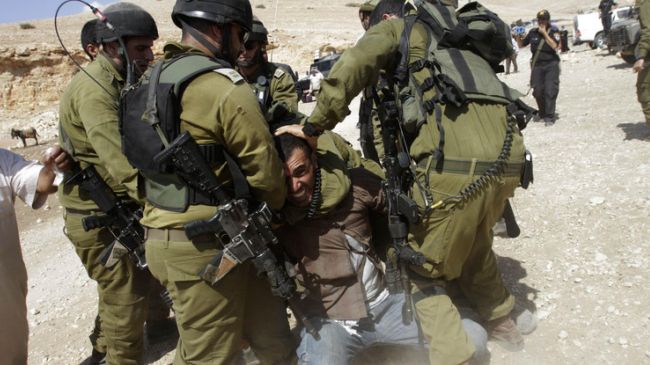



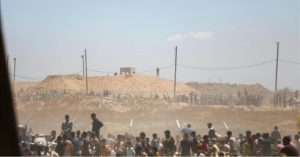

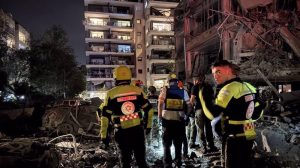

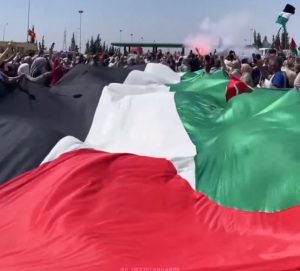

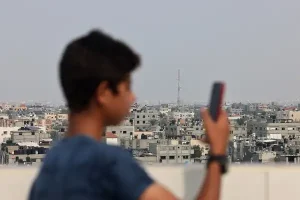


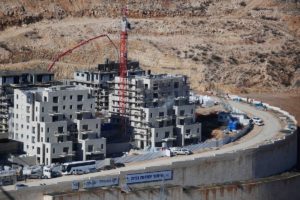
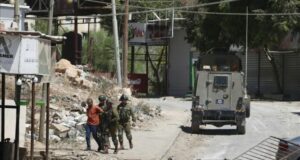
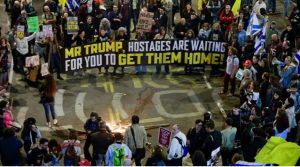



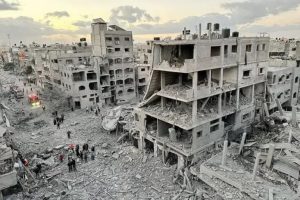

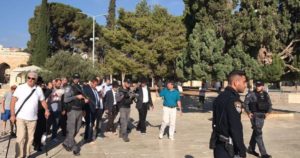





 Mina Indonesia
Mina Indonesia Mina Arabic
Mina Arabic